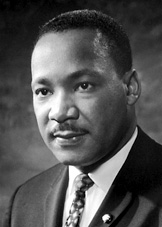Martin Luther King: You Can’t Slay The Spirit
January 21, 2013 by KitabuRoshi
Reverend Martin Luther King, Jr.
When it comes to those who have the power to inspire us to a higher degree of action, there are no cultural barriers. There are no barriers at all, if you are receptive to truth. When I was a youth and member of the great Third Baptist Church in Portsmouth, Virginia, I was surprised to hear Reverend C.H. Jordan speak of an India man he called, Mahatma Mohandas Ghandi. The surprise stemmed from my awareness that under normal circumstances no one deemed a Non-Christian was spoken of in a positive manner from the pulpit. It was clear that this Ghandi was someone special.
That Sunday we learned of a non-violent movement in India. Like African-Americans Indians were fighting for their freedom.They were in bondage to Britain. They sought to win that freedom, not with guns, bombs or tanks but with Ahimsa, a Philosophy of peace represented by Gandhi.
Mahatma Mohandas Ghandi
There was someone else we learned about from Reverend Jordan. It was he who taught us about the mission of Reverend Martin Luther King, Jr., also. We learned that King was so moved by the approach of Gandhi to the issue of Civil Rights, that he flew to India for a face to face with the Hindu Saint. The Christian minister came back to America charged up by the Hindu leader...the union was a great blessing. From it came the foundation of the Non-Violent movement in America. King was able to leap countries, cultures and religion to find a universal message, and Gandhi, too, became honored by those seeking an end to the chains of racism. He was living proof of the power of peace. Eventually, his struggle succeeded.
Before Dr. Martin Luther King won the Nobel Peace Prize he had galvanized the African American Community as never before. Those who felt powerless to seek change found themselves courageous enough to March in the street, facing angry cops, Police dogs and high-powered waterhoses, armed with nothing but their resolve. The broadcasted scenes embarassed the United States around the world. "The land of the free," did not seem free, at all.
Dr. King's image and range expanded. He became more than a Civil Right's leader. He was Social activist. Perhaps this expansion of his activity signaled to some that he was getting too dangerous. When he was in Memphis, Tenneesee to offer his support to Garbage workers on strike. he was assassinated. It was April 4, 1968.
Gandhi was also slain but he died with a peaceful contenance, offering a blessing to his killer. Peace prevailed. On the obvious level both King and Gandhi died at the hands of assassins but if we go beyond that we may understand that in these cases, death is superficial. "You can kill the body but not the soul," more accurately, the spirit continues. More than the name or image of Mahatma Gandhi is accessible, and the same is true for Dr. Martin Luther King. Once I attended a memorial in his honor, and noticed that his spirit was strong. His presence was strong. It is a phenomenon common to worshipers. Man is composed of the elements or essence of God, himself. If we give freely of ourselves, unselfishly of ourselves in life, it is entirely possible that our input continues on a more subtle but still discernible level, long after we're gone physically.
There are tranmitters and receivers. The leader, the spiritual votary transmits what is within them, hopefully, without reservation. If people are ready to receive, that message will come. A living person is a focal point but they are not the source of inspiration. A thought about the wise person can invoke the spirit of wisdom. Dr. King was assassinated in 1968 but his presence is still felt today. We celebrate his life ...meditate on that.
Live from your spirit!








Comments